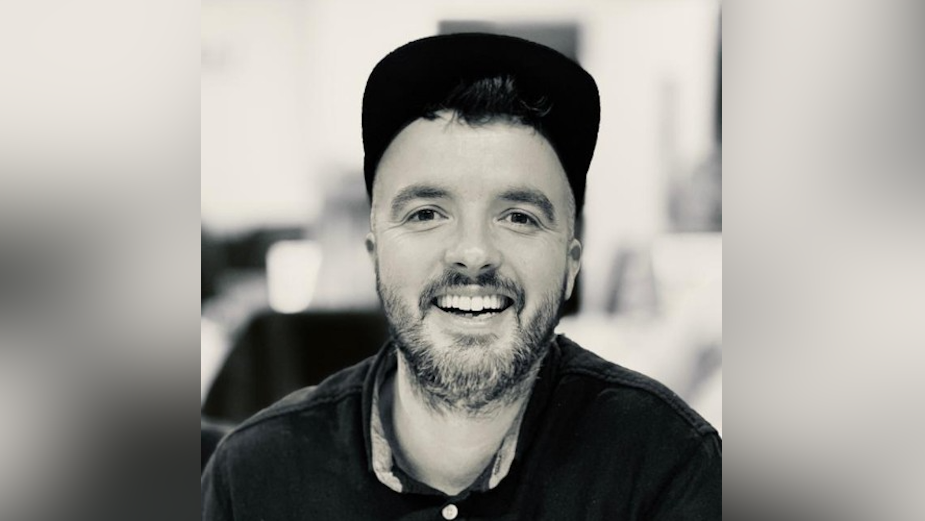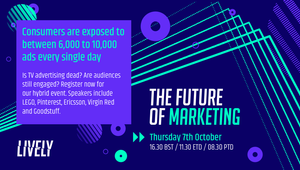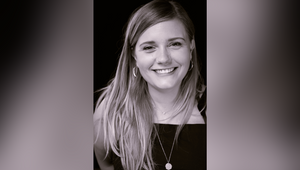
Production Line: Luke Hughes

As senior producer at Lively, Luke Hughes enjoys helping brands get their message out into the world, working across global content & digital campaigns. From setting up live broadcasts to overarching content strategy and everything in-between, he has worked with clients across the industry such as Adidas, Twitter, Hootsuite & Coinbase.
What lasting impact has the experience of the pandemic had on how you and your agency think about and approach production?
We’re incredibly thankful that a good-sized part of our business was already dedicated to content and digital production, so in a way the pandemic has reinforced a lot of what Lively believed in. Now our clients really see why we’ve long asked them to enhance physical events by engaging with a wider digital audience and capturing content, which makes our job easier.
Aside from Covid-19, what have been the most disruptive forces to hit agency production in the past few years?
Sustainability, agility in content production and the democratisation of technology.
A good producer should be able to produce for any medium, from film to events to digital. Do you agree or disagree with this statement?
I think that a good producer is normally a very organised person, which of course lends itself to producing anything. However, as with most things in life, lived experience normally moulds a person’s areas of specific knowledge. There are producers out there with a vast wealth of experience in event production who I wouldn’t necessarily call upon if I needed help producing a content series. That’s not to say they wouldn’t succeed, but you help your cause by surrounding yourself with people who have specific knowledge applicable to the brief.
And leading on from that, when it comes to building up your team at the agency, what’s your view on the balance of specialists vs generalists?
Building a team requires a base level of organisation that keeps everyone honest and the project ticking along, but it should be augmented by specialists.
What’s your own pathway to production? When you started out, what sort of work were you producing and what lessons have stayed with you in that time?
I started out in music, live streaming shows from various venues, big and small. We worked with labels to stream artists on tour, so we had to integrate with a tightly knit touring production team, which taught me how valuable it is to get as much work done in advance as possible, so that there are very few questions left on a live day. I also learned the value of being as courteous as possible: the people we were asking questions of had sometimes been on the road for months, with a show set up just the way they liked it, only for us to come along asking if we could stick a few cameras all over the venue and take some audio splits out the desk. You’ve got to think carefully about how you communicate when you’re making more work for people!
If you compare your role to the role of the heads of TV/heads of production when you first joined the industry, what do you think are the most striking or interesting changes?
The democratisation of technology has really impacted workflows, so where you’d once have a full OB truck and crew with racks control and 50 lines of analogue audio etc., you can now take much smaller teams. As a result I can now broadcast or record pretty much anywhere, using a much smaller footprint than would have previously been possible.
There are so many models for the way production is organised in the advertising industry - what setups have you found to be the most successful and why?
I think the more agile the better. A smaller, agile team is best placed to capitalise on the opportunities presented by activating a physical event. I also think that bringing in production, whether it be physical or digital, as early as possible in the planning process can gain brands enormous value, so they are best placed to extract the maximum return and make that event work harder.
What are your thoughts on the involvement of procurement in production?
Procurement sometimes feels like an unwanted hurdle so it helps to remind oneself it’s there to protect a business’s interests, just as a functioning agency should protect its own. The best experiences I have had with procurement have come when working collaboratively rather than being held at arm’s length. Building a constructive relationship in the first instance can make everything that follows so much simpler!
When it comes to educating producers how does your agency like to approach this?
Primarily you have set out the objectives of the business that we are all trying to achieve together. After that, lining up on how best to budget and report collectively. You do find a lot that people do like working in silos on their own Excel budgets, which in principle I’m not against, but you end up doubling up work when having to move that across into another format which is very counterproductive.
What new skills have you had to add to the team as a result of the pandemic?
We’ve brought in a full-time development team to help us build custom solutions for digital events. It’s a big undertaking but it stands us in good stead for the future.
Should production have a seat in the c-suite - and why?
I think there’s definitely a case for that. Production across all formats is what brings a brand’s comms and messaging to life. It’s the shop window that frames the product.
How have you approached integrating data with production workflows and processes? And, generally, how has data and the fact that we have constant live feedback on content performance changed production?
What we have learned to do is to use data more creatively rather than just for measuring KPIs. Now you’re beginning to see it being used to affect physical environments, react to live sentiment or build in gamified approaches to events and broadcasts. I think this is something you’ll see develop even further as we start to unlock and hybrid events propagate later into 2021.
Clients’ thirst for content seems to be unquenchable - and they need content that’s fast and responsive! What’s the key to creating LOTS of stuff at SPEED - without sacrificing production values? Is it even possible?
Identifying the opportunities that each event presents you with. Get stakeholders around the table as early as possible and discover as much as you can about the event narrative and messaging. Collaboration really is the key to getting the best, most focused content out of an event. Developing a graphical tool kit is essential as it gives anything you produce a much more polished outcome.
To what extent is production strategic - traditionally it’s the part that comes at the ‘end’ of the agency process, but it seems in many cases production is a valuable voice to have right up top - what are your thoughts/experiences of this?
It’s definitely the case the earlier you align production, the better a brand will realise its value. We always aim to deliver a more campaignable strategy within our content production. As well as the live day content opportunities, how is an event augmented in the weeks/months leading up to it, and how is value realised in the VoD and legacy hosting choices afterwards? Instead of looking at events as having a one- or two-day shelf life, it’s about building and maintaining engagement over a longer period of time.
What’s the most exciting thing about working in production right now?
I think that the hybrid event scene will come out the other end of the pandemic being ‘the new normal’ of events. Coupled with the rollout of 5G (aside from activating Bill Gates’ microchips), I think we are at a very exciting crossroads in the production scene as the increased bandwidths will enable brands to leverage vast remote audiences in real time to interact with their physical event production. I’m certain we will see some incredible executions in the coming years.
And what advice would you give to an aspiring agency producer?
Ask questions, be inquisitive – you can’t know everything about everything. Always look to collaborate, as this will help fill in any knowledge gaps. And be ready to react to the one or two surprises that will always appear on any production no matter how well pre pro has gone!










